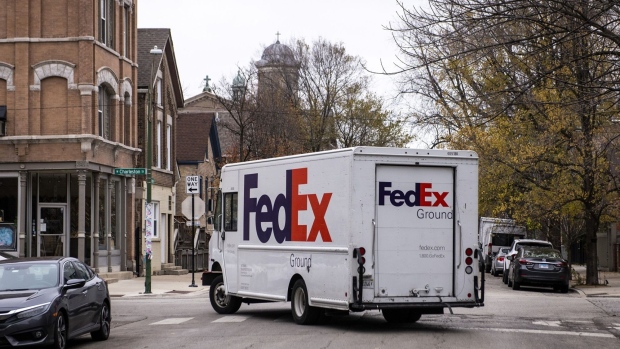Mar 11, 2022
FedEx Delivery Contractors Petition for Higher Payments After Holidays Left Them Short
, Bloomberg News

(Bloomberg) -- FedEx Corp. delivery contractors are demanding higher pay and changes to operations, stung by rising costs and a drop in compensation for the most recent holiday season.
Payments to the small companies that deliver packages for FedEx’s Ground unit were 20% higher during the 2020 peak season than last year, according to a petition signed by more than 800 of the operation’s roughly 6,000 contractors.
“In some markets, we have delivered more in 2021 but we made far less money,” said the petition, which was reviewed by Bloomberg News. “Making less money for adding more drivers and trucks is not an acceptable business practice.”
The decline is largely because contractors last season didn’t hit the thresholds necessary to get the extra fees they usually receive, after FedEx had set targets too high, according to the petition. It also said staffing shortages at sorting hubs delayed loading and that the courier’s new software system’s volume predictions were often incorrect.
In contrast to its own Express business and United Parcel Service Inc., FedEx doesn’t employ drivers for its Ground operation, relying instead on contractors -- often small operations with tight profit margins. That insulates the Memphis, Tennessee-based company from union organizing and pushes many costs, such as buying vehicles and hiring workers, onto contractors.
The petition is the first concerted effort by contractors to demand concessions from FedEx. The move follows changes over the last two years, such as shifting to seven-day service, that have squeezed contractor profits. The company also introduced Dynamic Route Optimization software to forecast volume so contractors can have sufficient trucks and drivers available. If those projections are too high, contractors can get stuck with expenses they can’t recoup.
“The FedEx model over the last two years has not quite kept up with what we are seeing in the economic landscape of business,” the petition said. The company isn’t compensating contractors for driver pay that jumped between 9% and 30% during the peak season amid last year’s labor shortage, it said. Meanwhile, costs for delivery trucks rose as much as $10,000, according to the petition, as semiconductor shortages meant supply couldn’t keep up with demand.
The action is unusual because delivery companies typically are deferential to FedEx, concerned over retribution for speaking out since their short-term contracts give the company a large amount of power.
“We recognize recent operational challenges may be affecting your business,” Kim Whigham, FedEx Ground’s vice president of business development said in a February response to contractors. “We understand the importance of volume forecasts and are actively working toward improvements.”
The company made limited payments to some contractors for December, according to some who received notification of the compensation.
The situation for contractors has gotten worse after fuel prices surged with Russia’s invasion of Ukraine, contractors said. FedEx pays them for only a small portion of rising fuel costs, they said.
“As our industry undergoes new and unprecedented challenges brought on by the explosive growth of e-commerce and rapidly shifting market dynamics, we remain committed to collaborating with service providers to create opportunities for success,” FedEx said in an email to Bloomberg.
Profit margins at FedEx’s Ground unit dropped to 7.2% for the six months through November, from 9.6% a year earlier. The company reports earnings for its fiscal third quarter on March 17.
Jimmy Bush said his business had grown and been profitable over the 13 years he’s been a FedEx contractor in Florida. He even recently raised cash by selling a portion of his routes to another contractor. But he’s been pinched since signing his latest deal with FedEx last year.
“I’ve been continuously losing money since my new agreement,” said Bush, who signed the petition. “It’s not sustainable.”
FedEx has been pushing additional costs and administrative duties onto the business that deliver its packages, said Mark Aikins, chief executive officer of Ground Pounders Inc., a delivery contractor that serves suburban Indianapolis.
“They’re squeezing us to death in the rates that they’re paying us, while they’re adding more non-revenue generating work and failing to adjust for increasing costs like fuel and labor,” he said.
©2022 Bloomberg L.P.


